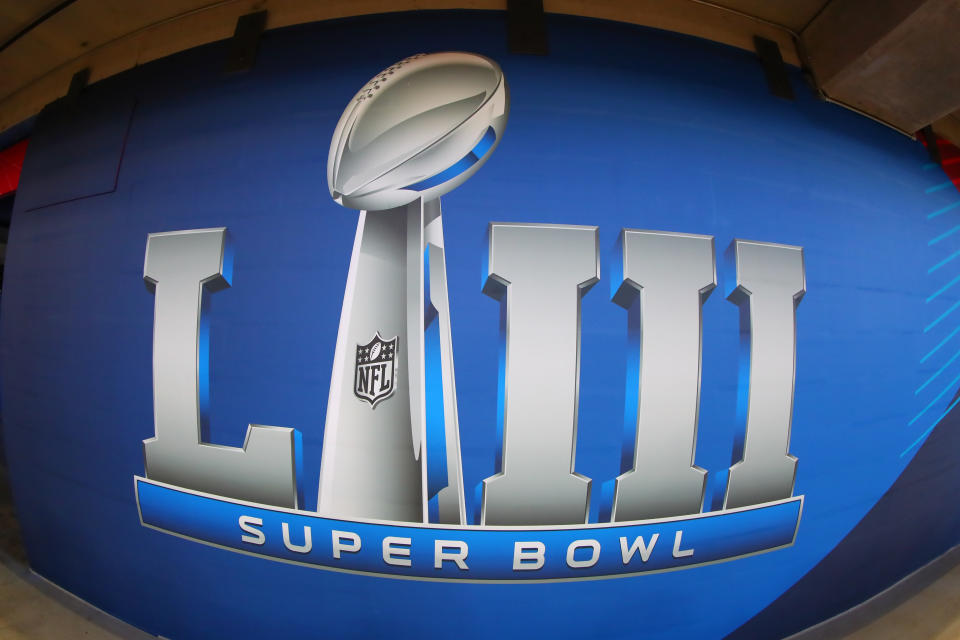How the Premier League's Super Bowl weekend power play helped soccer gain a foothold in America
The world’s most popular sport has never been the most popular sport in the United States.
Which isn’t to say soccer hasn’t made great strides over the past two or three decades in America. More kids are playing, more attention is being paid to the national teams and their infrastructure, and more soccer is available for consumption through the media.
That includes television rights to the Premier League, which NBC acquired in October 2012 for $250 million, outbidding previous rights holders FOX and ESPN in the process. NBC initially had a three-year deal to broadcast beginning with the 2013-14 season, but after ratings grew over the course of that first year, the network negotiated a six-year re-up in August 2015 worth nearly $1 billion.
Long story short, there’s big money in broadcasting soccer here now. And in the United States, there’s no bigger sports money than the Super Bowl.
Other major American leagues steer clear of the NFL’s championship game, never daring to broadcast live events during that audience-gorging black hole of a spectacle. But leagues like the NBA and NHL have offered appetizers and desserts, if you will, marquee matchups designed to give sports fans something to watch before or after the big game.
Over the past decade, the Premier League has adopted a similar mentality.
It’s the most-watched single league on the planet, and to be clear, it doesn’t need the United States to maintain that status. But ignoring this sports-rabid country as a potential growth market would constitute pointless arrogance, and one of the best ways to ensnare new fans is offering the same kind of big games other leagues do on Super Bowl weekend.
Let’s take a look back at how that’s gone, shall we?

The matches
The Premier League featured a marquee matchup on Super Bowl weekend on and off throughout the 2000s, so perhaps the best place to draw the starting line is over the past decade, from the 2009-10 season right up through the current campaign.
The “Big Six” of the Premier League, a group that has manifested itself recently through consistent finishes as league champions at best and Europa League qualifiers at worst, includes Arsenal, Chelsea, Liverpool, Manchester City, Manchester United and Tottenham Hotspur.
All those clubs have featured in the marquee game multiple times on Super Bowl weekend, and all except Spurs have featured four times on Super Sunday itself.
It started with Chelsea beating Arsenal 2-0 on Feb. 7, 2010, thanks to two goals from star striker Didier Drogba, and later that day the New Orleans Saints would beat the Indianapolis Colts in Super Bowl XLIV for their first championship in franchise history.
Perhaps the most memorable Super Sunday PL match took place in 2012, when Manchester United rallied from a three-goal deficit to draw Chelsea 3-3 on Feb. 5, the same day the New York Giants beat the New England Patriots to win the title for the second time in four years in Super Bowl XLVI.
Chelsea led 3-0 through 50 minutes and seemed well on its way to winning, but Wayne Rooney converted a pair of penalties before a wide-open Javier Hernandez headed home Ryan Giggs’ cross in the 84th minute to level the match (via BBC):
Chelsea got Super Sunday revenge on Feb. 7, 2016, when Diego Costa scored in stoppage time to snag a point in a 1-1 draw against United. Cesc Fabregas flicked a through-ball with the outside of his right foot that found Costa, who was kept onside by a painfully unaware Cameron Borthwick-Jackson (via Sky Sports):
That day’s Super Bowl, however, left something to be desired. Unless you’re a fan of the Denver Broncos, who beat the Carolina Panthers 24-10 behind a suffocating defense in Super Bowl 50.
Leicester City also has fond memories of the 2015-16 season, winning the Premier League title against 5,000-to-1 odds in one of the most extraordinary upsets in sports history. That meant the Foxes were given prime placement on Super Sunday the following year … and it didn’t go so well.
Manchester United routed Leicester 3-0 on its own turf at the King Power Stadium, with Zlatan Ibrahimovic, Juan Mata and Henrikh Mkhitaryan scoring either right before or right after halftime to decide the game early. Fortunately for fans of American football, Super Bowl LI later that day was one of the greatest ever played, with the Patriots rallying from a 28-3 deficit to beat the Atlanta Falcons in overtime.
Last year’s Super Sunday produced a thriller in its own right, with Liverpool and Spurs drawing 2-2 after both sides scored in second-half stoppage time. Mohamed Salah gave Liverpool the lead thanks to a brilliant bit of individual skill, but a few minutes later, Virgil van Dijk was judged to have kicked Erik Lamela in the back of the leg in the box.
Harry Kane, who missed a penalty earlier in the match, didn’t make a mistake the second time to salvage a point for Spurs:
Both teams qualified for the Champions League last spring, and Liverpool reached the Champions League final in May. The Philadelphia Eagles, meanwhile, beat the Patriots 41-33 in Super Bowl LII to win their first title in the Super Bowl era.
Which brings us to this year. On Sunday, Manchester City will host Arsenal in the marquee match at 11 a.m. ET on NBC Sports Network. On the undercard, Manchester United will visit Leicester.
For a complete rundown of the Premier League’s showcase Super Bowl weekend matchups, see the bottom of this post.
The audience
So how much of a difference has this scheduling strategy made?
Well, there are a few factors in play here. First of all, ratings information is not as readily accessible as one would hope, so while it’s clear TV titans like NBC and (more recently) Turner Sports see world soccer as something worth investing in, there isn’t always specific data beyond that.
Additionally, though NBC Sports Network is now available via satellite and through most cable and streaming services, the primary home of the Premier League is still a growing channel.
But it is growing. NBCSN finished as the second most-watched cable sports network in 2018, buoyed by the Winter Olympics in PyeongChang, South Korea. The Olympic bump occurs every other year, and the Premier League has become one of NBCSN’s foundational properties in the meantime.

In 2012, the wild Chelsea-Manchester United affair drew 1.38 million viewers, which at the time was the largest live audience for a Premier League match in U.S. history. In 2015, the Chelsea-Manchester City match played the day before the Super Bowl attracted an audience of 1.35 million viewers in the afternoon window, no doubt aided by the fact that both the match and the Super Bowl were broadcast (and therefore heavily advertised) on NBC networks.
Those high numbers have leveled off a bit the past couple years, however. In 2016, the Chelsea-Manchester United match drew an audience of 779,000, which was only good enough for fourth-highest viewership that season alone.
In 2017, the marquee match got just 575,000 viewers, with the heavy draw of Manchester United perhaps offset by atypical defending champion Leicester City. Last February, Liverpool-Spurs grew that viewership to 692,000, with the typically popular Reds picking up the slack of a tepid draw like Tottenham.
So there are expected variations across the board, from the teams involved to the viewing window to the network promotion. And, to make a point that can be spun in whatever direction you please, the novelty of being able to watch big matches on American television might just be wearing off. The Super Bowl weekend games have been among the best performers of the season, and that’s the best thing you can consistently say.
The impact
The lesson here, then, lies in the broader scope.
If you would have told soccer fans at the turn of the century that not only would the Premier League be readily watchable on a subsidiary of one of the biggest television networks in the country, but that network would give it valuable Super Bowl weekend slotting as part of a billion-dollar coverage deal, don’t you think they’d be thrilled?
And the Premier League’s success on American television has aided in the founding of other cable sports networks that have focused their strategies around soccer. FOX Sports 1, FS2 and FOX Soccer Plus are now home to the German Bundesliga, where several Americans play. BeIN Sports is home to La Liga, where you can see Barcelona, Real Madrid and the strongest quality of soccer in the world. BeIN also carries Serie A in Italy and Ligue 1 in France. And that’s not to mention the apps and streaming services that have popped up through various networks.

There’s more demand for soccer in the United States than ever before. Will it beat the NFL in the ratings anytime soon? Of course not. But it doesn’t have to, because nobody else does, either, and that hasn’t stopped the NBA, college football or other sports from growing themselves.
There are valid arguments to be had about the ways soccer is marketed by both the leagues and the networks that carry them. But maximizing exposure, even if it means piggybacking off other leagues’ popularity, is not one of them.
Besides, it costs the Premier League nothing. Move a marquee match or two onto the same weekend as the Super Bowl. It doesn’t kick off until the middle of the night in Europe, anyway. What’s the harm?
There is none. And hopefully going forward we’ll continue to see a ton of great matchups on Super Bowl weekends.
Super Bowl weekend showcase rundown
Feb. 7, 2010
Premier League: Chelsea 2, Arsenal 0
Super Bowl XLIV: Saints 31, Colts 17
Feb. 6, 2011
PL: Liverpool 1, Chelsea 0
Super Bowl XLV: Packers 31, Steelers 25
Feb. 5, 2012
PL: Chelsea 3, Manchester United 3
Super Bowl XLVI: Giants 21, Patriots 17
Feb. 3, 2013
PL: Manchester City 2, Liverpool 2
Super Bowl XLVII: Ravens 34, 49ers 31
Feb. 2, 2014
PL: Chelsea 1, Manchester City 0 (played the day after on Feb. 3)
Super Bowl XLVIII: Seahawks 43, Broncos 8
Feb. 1, 2015
PL: Chelsea 1, Manchester City 1 (played the day before on Jan. 31)
Super Bowl XLIX: Patriots 28, Seahawks 24
Feb. 7, 2016
PL: Chelsea 1, Manchester United 1
Super Bowl 50: Broncos 24, Panthers 10
Feb. 5, 2017
PL: Manchester United 3, Leicester City 0
Super Bowl LI: Patriots 34, Falcons 28 (overtime)
Feb. 4, 2018
PL: Liverpool 2, Tottenham Hotspur 2
Super Bowl LII: Eagles 41, Patriots 33
Joey Gulino is the editor of Yahoo Soccer and moonlights as a writer. Follow him on Twitter at @JGulinoYahoo.


